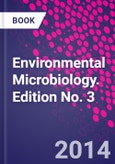Designed for advanced undergraduate students, graduate students, and environmental professionals, this book builds upon the tremendous success of the previous editions with a comprehensive and up-to-date discussion of environmental microbiology as a discipline that has greatly expanded in scope and interest over the past several decades. From terrestrial and aquatic ecosystems to urban and indoor environments, this edition relates environmental microbiology to a variety of life science, ecology, and environmental science topics including biogeochemical cycling, bioremediation, environmental transmission of pathogens, microbial risk assessment, and drinking water treatment and reuse. The final chapter highlights several emerging issues including microbial remediation of marine oil spills, microbial contributions to global warming, impact of climate change on microbial infectious disease, and the development of antibiotic-resistant bacteria.
Please Note: This is an On Demand product, delivery may take up to 11 working days after payment has been received.
Table of Contents
1. Introduction to Environmental Microbiology2. Microorganisms Found in the Environment
3. Bacterial Growth
4. Earth Environments
5. Aeromicrobiology
6. Aquatic Environments
7. Extreme Environments
8. Environmental Sample Collection and Processing
9. Microscopic Techniques
10. Cultural Methods
11. Physiological Methods
12. Immunological Methods
13. Nucleic Acid-Based Methods of Detection
14. Microbial Source Tracking
15. Microbial Transport in the Subsurface
16. Biogeochemical Cycling
17. Micoorganisms and Organic Pollutants
18. Microorganisms and Metal Pollutants
19. Microbial Diversity and Interactions in Natural Ecosystems
20. Microbial Communitation: Bacteria-Bacteria and Bacteria-Host
21. Bioinformation and "Omic" Approaches to Characterization/Microbial Communities
22. Environmentally Transmitted Pathogens
23. Indicator Microorganisms
24. Risk Assessment
25. Municipal Wastewater Treatment
26. Land Application of Organic Residuals: Municipal Biosolids and Animal Manures
27. Recycled Water Treatment and Reuse
28. Drinking Water Treatment and Distribution
29. Disinfection
30. Domestic and Indoor Microbiology
31. Global Emerging Microbial Issues in the Anthropocene Era








